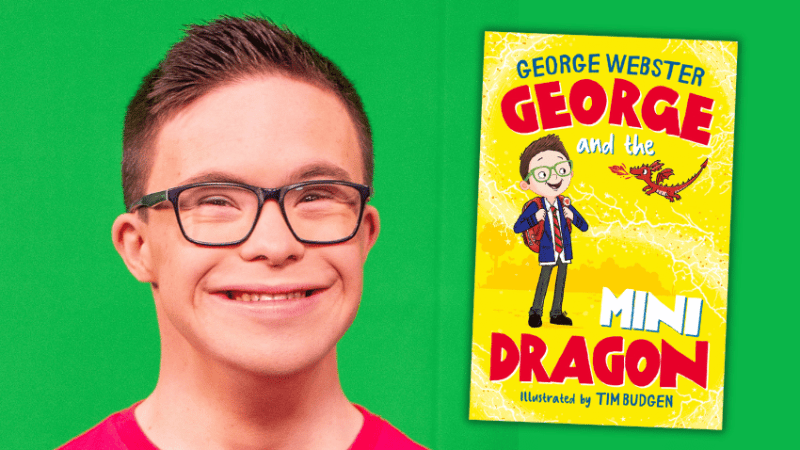Tricky words – A guide to teaching exceptional spellings in KS1 and KS2
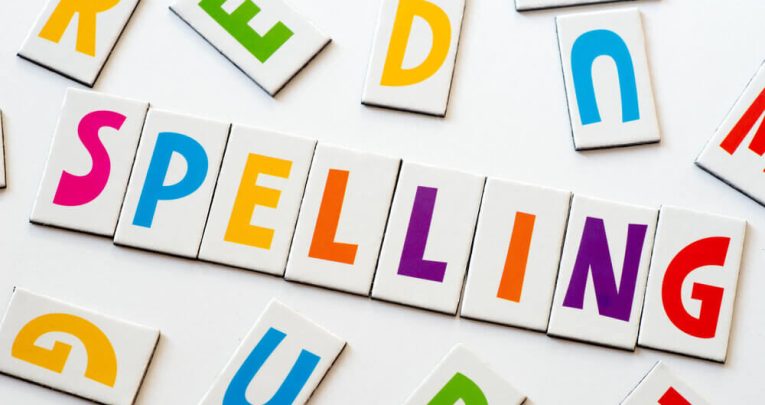
How to teach high frequency words and common exception words in KS1 and KS2…

- by Teachwire
- Classroom expertise and free resources for teachers
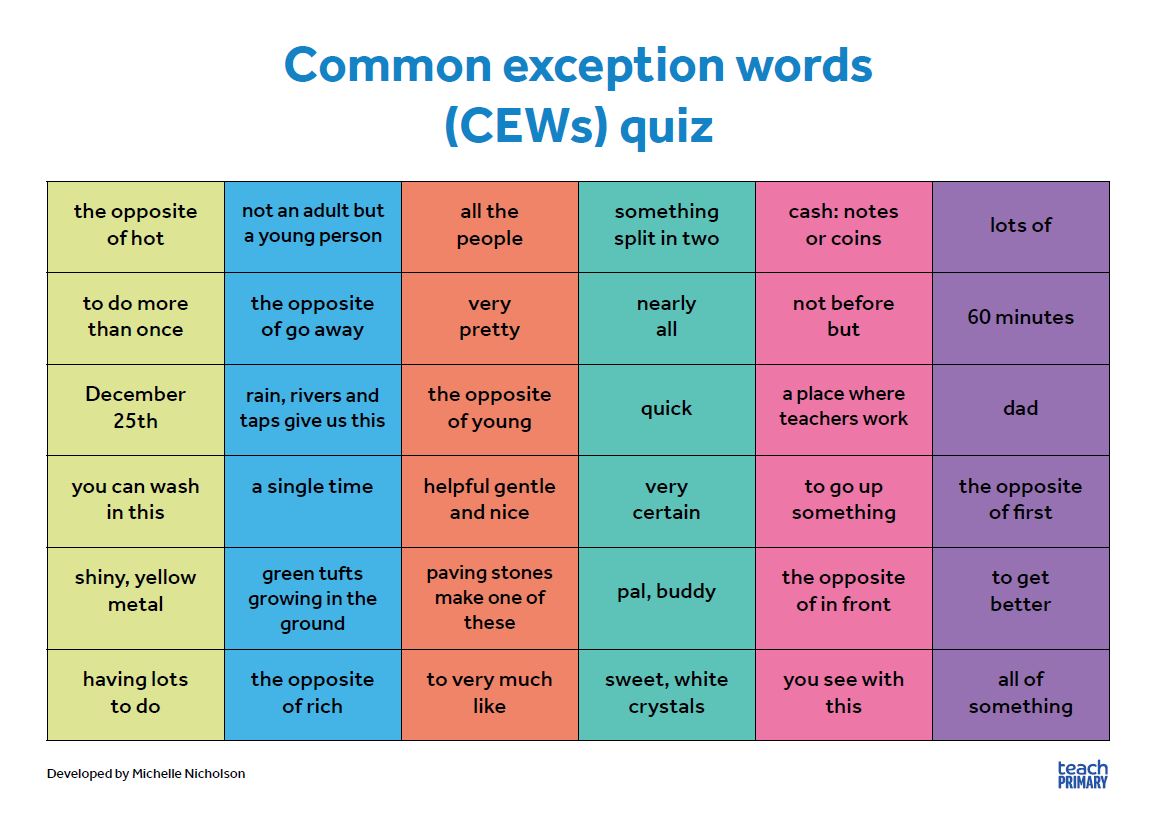
When it comes to tricky words, do you ever stop to wonder why the number two is written with a ‘w’ or why we pronounce the words ‘paid’ and ‘said’ differently?
If you do, the chances are that you find the complexities of the English spelling system and its tricky words intriguing and absorbing.
The chequered history of this country leaves its legacy in our rich language, although the wealth of vocabulary it bequeaths can be the root of the spelling difficulties that some children experience.
With approximately 40 phonemes (speech sounds) versus 250 possible grapheme correspondences in the English language, it is certainly a rather involved process to master all the possible variations.
To many, the English spelling system may seem hostile and unpredictable – and consequently difficult to teach. But is it as capricious as it appears?
A study by Hanna, Hanna, Hodges and Rudorf (Phoneme-grapheme correspondences as cues to spelling improvement, 1966), concluded that only 4% of commonly used words have spellings that cannot be predicted by their pronunciation. Unfortunately, this percentage does represent words in the highest usage.
Anglo-Saxon origins
The most frequently used words in the English language are typically those that refer to everyday objects, activities, or emotions, and these have always been part of our vocabulary; imported words are generally synonyms or words that add an extra layer to our basic communication.
Of the most common 100 words used in the English language, all of them have Anglo-Saxon origins. Unfortunately, pronunciation changes more rapidly than spelling, so the encryption of many of Old English words often corresponds to articulation long since disappeared, leading to seemingly tricky words.
Clues can sometimes be found in other, similarly spelled, words. If you think back to my earlier mention of paid and said, we can spot the same tense changes in the spellings of pay and paid, and say and said, and begin to guess how said may have been pronounced in ages past.
While it is acknowledged that the root to successful reading and spelling acquisition lies in a systematic phonics approach, we don’t get too far before we bump into words that children need to use, but which do not fit into the correspondences they have learned.
Are common exception words tricky words?
The words no, go and so are not accessible when at first you only know the o grapheme making an ‘o’ phoneme, as in hot and dog. Some schemes call such words ‘tricky words’, others ‘red words’, and the National Curriculum refers to them as ‘common exception words’ (CEWs).
These irregular spellings are taught alongside more readily decodable words and added gradually to keep cognitive load manageable for young children.
Therefore, by the time pupils leave Year 1, they should have been taught to read and spell the first 100 highest-frequency words, some of which do not match grapheme-phoneme correspondences (GPCs) taught so far.
If you have children in your class who are still struggling with the spelling of any – or all – of these tricky words, it’s worth looking back to your school’s chosen SSP scheme and noting the order of teaching for these words (there is little variation on this between the schemes).
Prioritise pupils’ learning of these words in that same order, as these are likely to be the ones they will need most in their writing.
- – Read common exception words, noting unusual correspondences between spelling and sound and where these occur in the word
- – Spell common exception words
- – Write from memory simple sentences dictated by the teacher that include words using the GPCs, common exception words and punctuation taught so far
EYFS tricky words
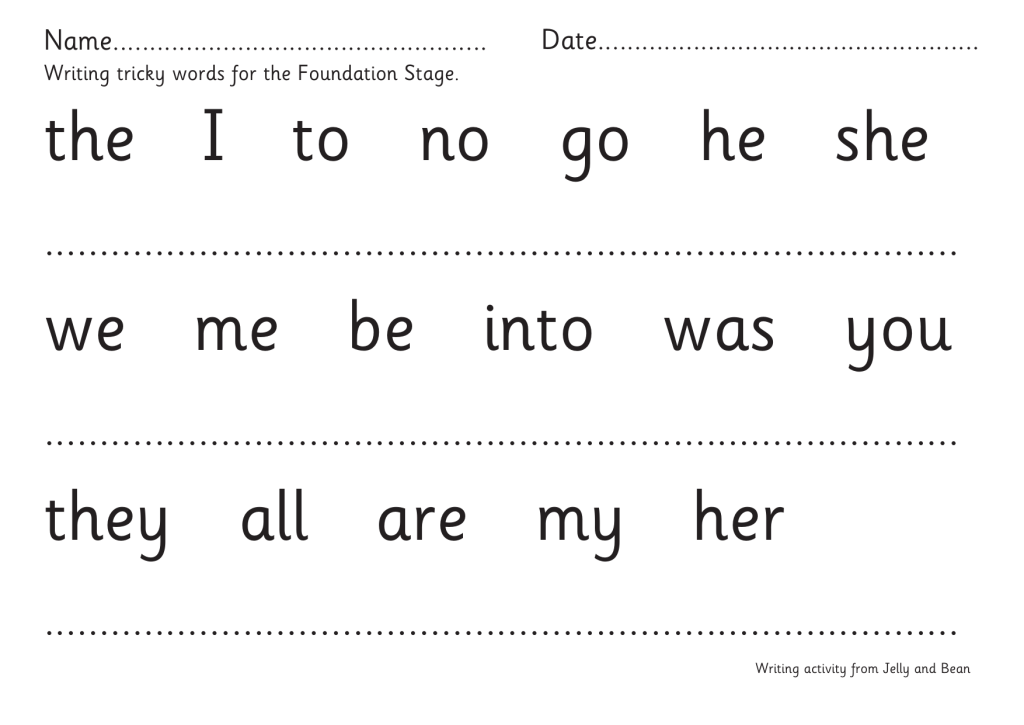
This simple Reception worksheet lets children practise their letter formation and handwriting by copying words underneath.
Year 1 tricky words
Here is the list of Year 1 common exception words, or tricky words, that appear in the National Curriculum spelling appendix:
- the
- a
- do
- to
- today
- of
- said
- says
- are
- were
- was
- is
- his
- has
- I
- you
- your
- they
- be
- full
- house
- our
- he
- me
- she
- we
- no
- go
- so
- by
- my
- here
- there
- where
- love
- come
- some
- one
- once
- ask
- friend
- school
- put
- push
- pull
- full
- house
- our
Year 2 tricky words
The Year 2 spelling appendix presents us with another tranche of common exception words, or tricky words, that children should master by the end of the year:
- door
- floor
- poor
- because
- find
- kind
- mind
- behind
- child
- children*
- wild
- climb
- most
- only
- both
- old
- cold
- gold
- hold
- told
- every
- everybody
- even
- busy
- people
- water
- again
- half
- money
- Mr
- Mrs
- parents
- Christmas
- great
- break
- steak
- pretty
- beautiful
- after
- fast
- last
- past
- father
- father
- class
- grass
- pass
- plant
- path
- bath
- hour
- move
- prove
- improve
- sure
- sugar
- eye
- could
- should
- would
- who
- whole
- any
- many
- clothes
Note: ‘children’ is not an exception to what has been taught so far but is included because of its relationship with ‘child’.
Try our Y2 common exception words spelling quiz.
KS1 spelling list
It is worth mentioning that the exact contents of these lists are not statutory, and the National Curriculum notes mention that other words could be included depending on the phonics and spelling programmes you use.
Personally, I would add the word does and the numbers one, two, four and eight to Year 1 for instance. Where would you include the spelling of Monday and Wednesday?
You should also pay attention to where these words are taught in your phonics scheme, as some programmes will introduce some of these earlier or not at all.
One of the reasons that this is not a statutory list is that some of these words are perfectly regular in certain regional accents whereas their pronunciation in others renders them difficult to encode.
For example, past, last, fast, path and bath are not exceptions in accents where the a is pronounced /æ/, as in cat.
Teaching tricky words
As children are taught the less common spelling alternatives to phonemes, many of the ‘tricky’ words become logical. The spellings of love, eight and Christmas are all unpicked alongside month, weigh and chorus in Year 3/4 spelling objectives, for example.
However, there remains within that list of common exception words many high-frequency words whose encryption seems to fly in the face of any spelling rule or convention.
The labelling is apt. Perhaps because of their anomalies, these words will often present difficulties to children throughout their time in primary education.
But why is it important to support learners to master these seemingly unconquerable words? Part of the answer lies in building children’s overall accuracy and self-esteem.
As these words represent such a high proportion of words commonly used, a child’s writing will appear littered with mistakes if they haven’t learned enough of them.
Children are generally perceptive of their own strengths and weakness, and a child who makes errors in high-frequency words will often take a disproportionately dim view of their capabilities.
Another issue is that if children have not mastered these often-used words, cognitive load is taken up with encoding. This interrupts other transcriptional and compositional skills, making writing harder for the child.
With that in mind, here are some practical ways that you can support children to internalise these spellings:
Teach often
Frequent usage should suggest frequent teaching and yet these words are perhaps not revisited enough in lessons. KS2 pupils still need to be taught strategies to support them to learn and remember these words.
Gaps in KS1 spelling knowledge are often a blocker to meeting the end of Year 6 expectations for writing. Testing alone will not help, but spaced recall is important.
Include these words on a regular basis so that they move from the short-term memory to the long-term memory and become locked in.
Isolate the tricky part of the tricky word
Even the most exceptional spellings have some predictable GPCs. Begin by asking the child to identify these parts of the word – the s and d in said, for instance. Map these onto a phoneme frame and add in the tricky part, perhaps in an alternative colour, like this:
S AI D
Now support pupils to focus on remembering the irregular part, perhaps using some of the following strategies:
Explore etymology
I find that children are often as fascinated as I am by the word origins that influence seemingly random spellings. At the beginning of this article, I referenced the odd spelling of the number two.
Whilst its homophone ‘to’ has the alternative variant of the oo phoneme (/uː/) spelled with one o, there is seemingly no logic to this word having a silent w in the middle. Not until you explore the history of this word, that is.
From the Old English words twa and twegen representing the number that is ‘one more than one’, this number shares roots with other European languages including dwa in Polish, två in Swedish and zwei in German.
The word twain has still just about survived in English, but we no longer hear the w sound that used to be pronounced in two.
However, when we consider other words that are analogous (such as twelve, twenty, twin, twice and between) we can make an exciting comparison that may help to secure the spelling of this word.
Find analogies
When teaching common exception words, try to group them with other words that share the target grapheme such as:
he, me, she, we
could, should, would
Trending
wild, mild, child / kind, find, mind
This enables children to spot patterns in words and secure several words at once.
Help pupils to explore connections in meaning, too, especially when there can be distraction homophones in the mix: here, there and where all have a link to position which might help children trying to select the correct spelling option, and the words the, them and they might support the spelling of the latter miscreant.
Explore mnemonics
The key to word mnemonics is to keep them simple and useful. Let’s take the word because as an example. Children may remember that ‘big elephants can’t always use small exits’, but what if their spelling of use begins with the letter y or the word always is also tricky for them?
And pupils may find it hard to hold onto all seven words in that mnemonic while they construct the target word. Instead, focus on the tricky part of the word: ‘ause’ in this case.
Try to include the word in the mnemonic to lessen cognitive load, e.g. a memory trigger for the word people could be: people eat omelettes, people like eggs. Sometimes a rhyme can help as well, such as ‘there is no ‘a’ in they’.
Grow automaticity
‘Sight’ learning is not a helpful strategy. Because there are so many words, often very similar in appearance, most children won’t be able to memorise too many spellings in this way.
However, overlearning, with a view to automaticity, is the key. Constant revisiting and writing of these words will cement the spelling, creating an unconscious habit that is the result of visual familiarity and muscle memory.
So, set pupils challenges such as ‘How many times can you write the word in joined handwriting in one minute?’ or ‘Can you spell this word with your eyes closed?’
It can be fun to set passwords on IT equipment as commonly misspelt words to encourage accuracy!
Monitor constantly
Do you sometimes wonder why there are certain words that children always seem to misspell? The answer is linked to the point above; if a word is used frequently and misspelt from the outset, it won’t be long before a mistake turns into a permanent habit.
To prevent this, ensure errors in high-frequency words are addressed promptly. If a Year 1 child spells the word they with an a five times in one week – or even in one piece of writing – and it isn’t picked up immediately, the chances are you’ll still be battling to undo that muscle memory in Year 5!
Point out these inaccuracies from the outset and then have high expectations as a school for the correct spelling of this word moving forward.
Self-regulation
Children need to take responsibility to ‘seek and destroy’ any words they should now spell correctly.
I like to have a list of words for each year group, mistakes from which are no longer acceptable or ‘past their sell-by date’. Words on this list become ‘non-negotiable’ and should be monitored by the pupil and self-corrected.
Pupils can make a little bookmark for their writing books with a list of up to six words that they need to check.
Once they have mastered a word, they can remove it from the bookmark and add another challenging word. Download free templates for KS1 and KS2 bookmarks from Plazoom.
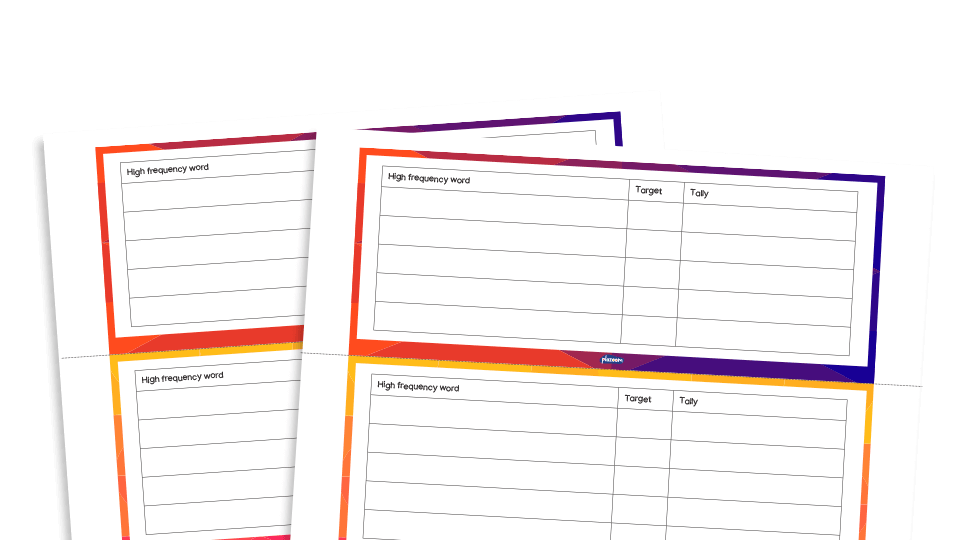
Allow time for ‘proofing pitstops’ at frequent intervals where children can check for misspellings and missing punctuation.
It is much easier for pupils to spot these in smaller chunks of writing than to wade through a finished composition.
Provide common exception word lists and mats to assist the children with their independence.
Have fun with words
Above all else, it is important that children learn to enjoy words and spelling; to see the process as a fun code to crack rather than a battle to fight.
In the words of the eminent linguist David Crystal, “The story of the English writing system is so intriguing, and the histories behind individual words so fascinating, that anyone who dares to treat spelling as an adventure will find the journey rewarding.”
Michelle Nicholson is a teaching and learning adviser for Herts for Learning and the author of ESSENTIALspelling.
Common exception word spelling packs
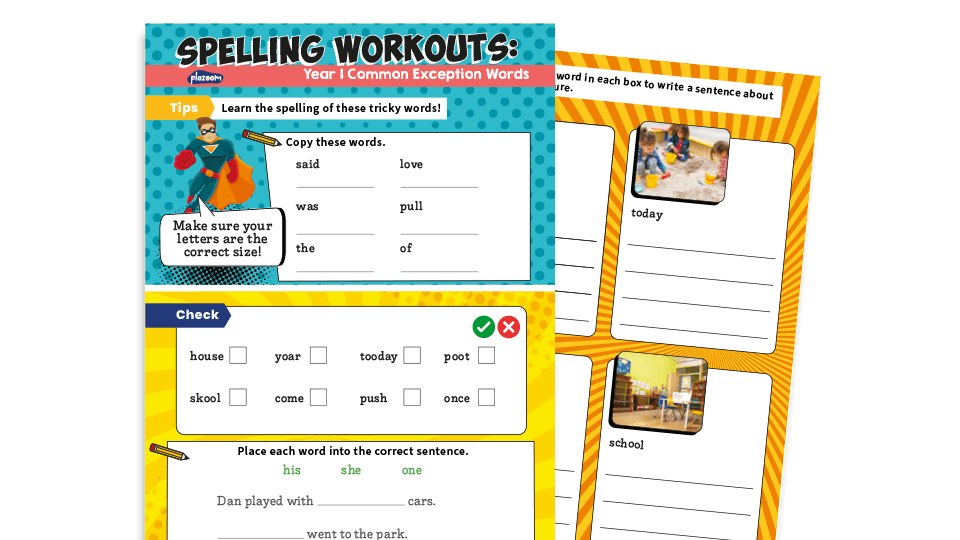
Make sure your students can confidently and correctly write all the tricky words and statutory spellings from Year 1-6 with literacy resource website Plazoom’s attractive worksheets and useful dictation sentences packs.
More ideas for teaching tricky words in KS1

Angela Carss and David Waugh look at the trick to teaching common exception words in KS1…
Grouping words together
Teaching similar words in order to teach more than one at a time lets children begin to understand that some words have similar morphology (structure) and etymology (origins), and start developing an understanding of how words work.
Groups might be based on words with the same unusual grapheme-phoneme correspondence. For example, ‘here’, ‘there’ and ‘where’ have the same grapheme, but represent different phonemes in ‘here’ and ‘there’.
Or you could use collections of functional words (those that help to structure sentences, such as ‘because’ and ‘many’) or content words (those such as ‘wild’ and ‘beautiful’ that add meaning and detail to sentences).
Supplementing your list
Once you’ve established your word group, children can add to it to extend learning beyond the national curriculum’s suggested words.
For example, once children in Y2 learn ‘find’ and ‘kind’ from the list of common exception words, they will be keen to add others that they already know with the same phonemes, such as ‘mind’ and ‘rewind’.
This could form part of a poetry-writing lesson in which banks of rhyming words are created as a resource for children to draw upon when writing verse.
Below is the list of suggested common exception words for Y1. How many different ways can you group some of the words together? Are there any words in the list that you don’t think can be grouped with others?
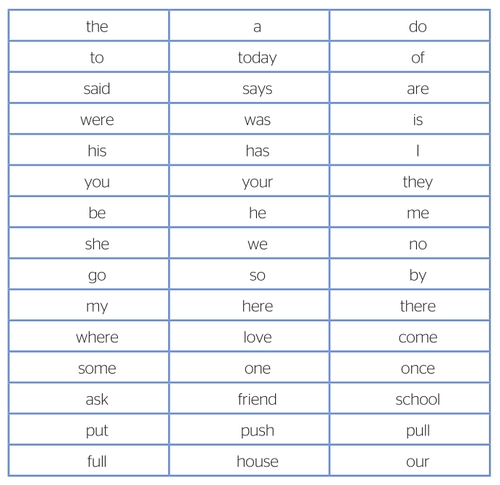
Adding actions to words
You can help children remember words by providing a physical prompt for them to mime when looking at a word. For example, ‘house’ can be demonstrated by using your arms to make a triangular roof shape above your head.
Try it out for yourself. Which of the Y1 common exception words are suitable for adding an action, and how does that action look?
Build a working wall
Creating an enriching classroom environment, with a focus on supporting the teaching of words with unusual grapheme-phoneme correspondences, is important.
A working wall, where both adults and pupils can display useful materials, provides a focal point where word groups, learning aids and other resources can be used for reference.
Sticky notes are useful for collecting ‘tricky’ words, and for highlighting where they can be found in texts and other reading materials.
Teaching aids such as word mats and flashcards are invaluable – many good examples of these can be found online.
Angela and David are joint authors, with Wendy Jolliffe, of Teaching Systematic Synthetic Phonics in Primary Schools, published by Learning Matters.
More tricky words resources
Spooky Spellings online game
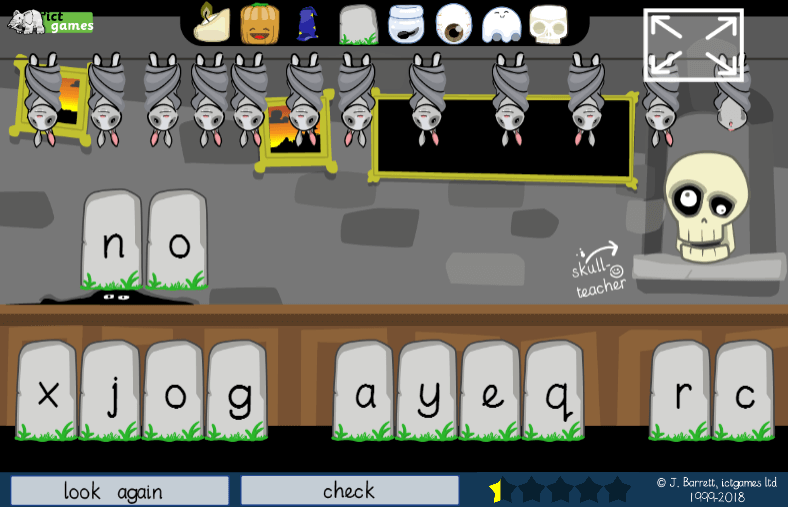
Practise spelling common exception words for ages 5 and up with this spooky online game.
It uses the National Curriculum’s list of common exception words, and asks children to arrange the letters in the correct order to spell each one.
Give these other offline and online spelling games a go to consolidate spelling skills and eradicate common mistakes.
CEW sentence worksheets
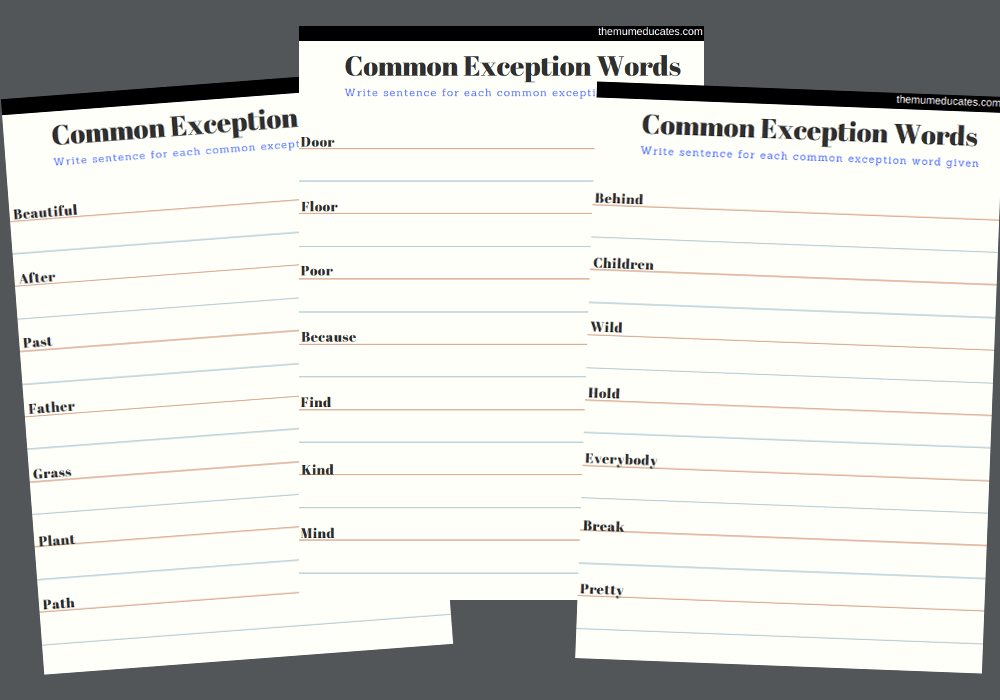
Simple and easy, these worksheets feature a selection of common exception words with space to write a sentence for each one. There are six pages in all, with 42 words.
First 100 high-frequency words
- the
- that
- not
- look
- put
- and
- with
- then
- don’t
- could
- a
- all
- were
- come
- house
- to
- we
- go
- will
- old
- said
- can
- little
- into
- too
- in
- are
- as
- back
- by
- he
- up
- no
- from
- day
- I
- had
- mum
- children
- made
- of
- my
- one
- him
- time
- it
- her
- them
- Mr
- I’m
- was
- what
- do
- get
- if
- you
- there
- me
- just
- help
- they
- out
- down
- now
- Mrs
- on
- this
- dad
- came
- called
- she
- have
- big
- oh
- here
- is
- went
- when
- about
- off
- for
- be
- it’s
- got
- asked
- at
- like
- see
- their
- saw
- his
- some
- looked
- people
- make
- but
- so
- very
- your
- an
Via highfrequencywords.org
Browse more Year 3 and 4 spelling list resources, Year 5 and 6 spelling list resources and spelling worksheets.









